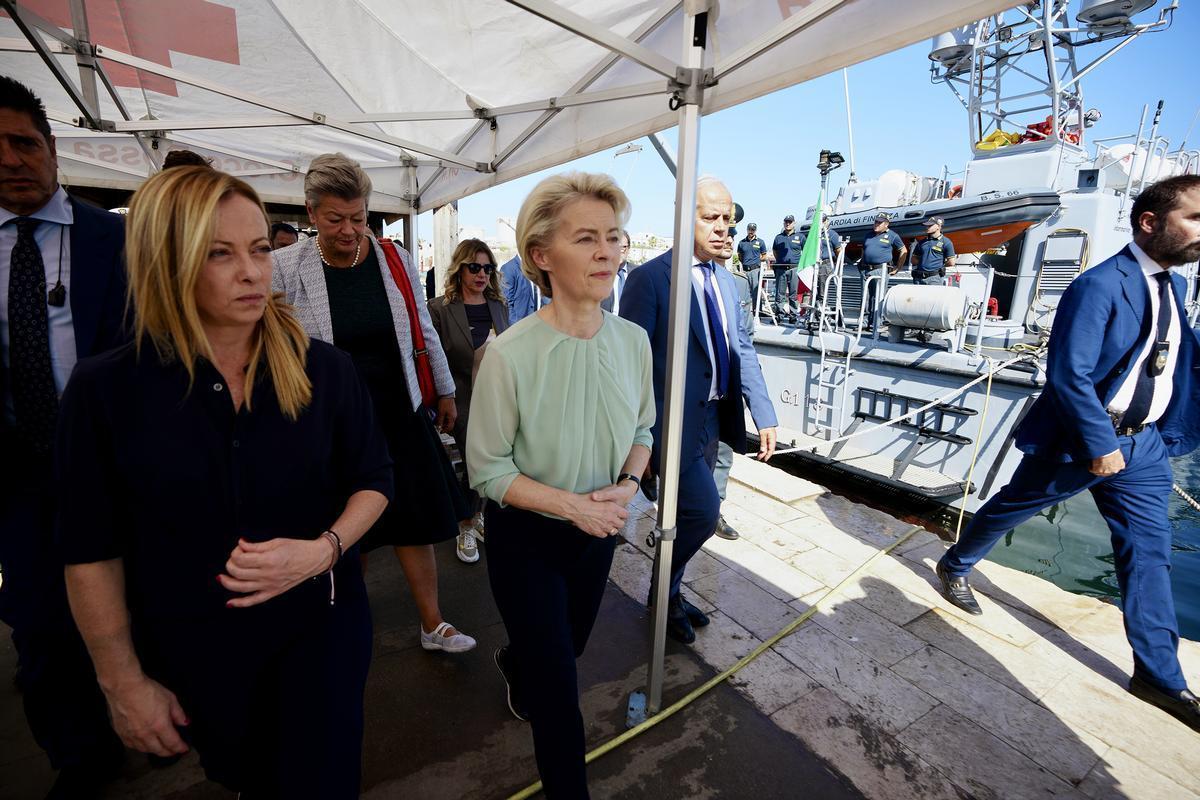
Europee 2024: fuorisede e residenti all'estero, gli esclusi dal voto



11 aprile 2024
'A huge achievement' for European Commission President Ursula Von der Leyen. "The death of the right to asylum" according to activists who protested by symbolically placing a plaque in front of the entrance to the Altiero Spinelli building in Brussels. Yesterday, the European Parliament approved the new 'Asylum and Migration Pact', at the end of a path that began almost ten years ago, amidst attempts at reform, vetoes, and resistance. The package of ten measures, the result of a compromise reached between the Council and Parliament last December on a Commission proposal formulated three years earlier, introduces significant changes in the internal management of migration. Now the official green light from the Council is missing, but it will still be two years before the new rules enter into force.
The new pact introduces a compulsory solidarity mechanism between member states to ease the pressure on first-arrival countries. Each member state will be able to choose whether to accept a quota of asylum seekers on its territory through relocation or to guarantee financial (€20,000 per applicant), operational and technical support to the country that will take charge of them.
The Council's objective is to carry out 30,000 relocations per year, a derisory quota compared to the one million and more asylum applications received throughout the Union in 2023. In any case, the cardinal principle of the Dublin III regulation does not change: the burden of processing asylum applications remains with the countries of first entry, including Italy.
Those who arrive on European territory irregularly, i.e. without the necessary visas following a landing or a land border crossing, will undergo a new screening procedure, which includes identification, collection of biometric data such as fingerprints and facial scans, a health check-up and security checks. Biometric data will be shared among all Member States via the Eurodac database. The procedure, which also applies to unaccompanied minors, may last a maximum of seven days, during which asylum seekers may be detained.
After screening, asylum seekers may be subjected to an accelerated border procedure lasting up to 12 weeks. This will be applied ex officio for those from countries with an asylum application admission rate of less than 20 per cent, as well as for those who are considered a 'threat to national security or public order' (including unaccompanied minors) and those who provide false information to the authorities. Member states will have to provide adequate facilities to accommodate asylum seekers during the examination of their applications: the goal is to make 30,000 posts available. In case of a negative outcome of the examination, repatriation is expected within 12 weeks. The regulation also intervenes on ordinary procedures, imposing a maximum time limit of 6 months for national authorities to decide on applications for protection in the first instance.
Drones in Niger and radar in the Mediterranean: EU spends billions on high-tech borders
In the event of a negative outcome of the accelerated procedure, the migrant may be returned immediately to the country of origin or transit if it is on the list of 'safe third countries' and the migrant maintains 'reasonable links' there. Tunisia, for example, is considered safe, where a serious deterioration of migrants' rights has been ongoing for months, with several incidents of police violence and illegal refoulement to Algeria and Libya. Accelerated refoulement is possible thanks to the so-called 'non-entry fiction' that the new pact endorses: although the migrant is physically on EU territory, he is not considered to be legally so until the authorities admit his application. Until then he/she can be rejected without the possibility of appeal.
In situations of exceptional pressure on the reception system, the state in question may request the Commission to declare a state of crisis. In that case, special solidarity mechanisms are activated, such as relocation of some of the migrants to other member states or financial support. Exemptions are also applied to border procedures, the duration of which can be extended by six weeks. The emergency measures also apply in cases of 'instrumentalisation of migrants', i.e. where other states or 'hostile non-state actors' (a non-explicit reference to the NGOs active in sea rescues wanted by PM Meloni) encourage the flows to 'destabilise the Union or a member state'.
In Nigeria, Europe looks for oil and doesn't care about the environment
The vote in the Europarliament saw the ranks of the majority that supports the Von der Leyen Commission, formed by the European People's Party (EPP, centre-right), the Socialists and Democrats (S&D, centre-left) and Renew Europe(Re, centre), break. Among the Italian MEPs, Forza Italia voted in favour of all measures, faithful to the line of the EPP. The Democratic Party, on the other hand, dissociated itself from the rest of S&d by rejecting almost the entire package: 'The compromise reached is characterised not only by serious and unacceptable shortcomings on the human rights front, but also from the point of view of Italy's specific interests,' reads the communiqué of the delegation in Brussels. Also opposed was the 5-Star Movement, whose leader Giuseppe Conte said on X: "The European Pact on Immigration and Asylum approved by the European Parliament leaves Italy alone in receiving migrants and even ends up worsening the burden on the countries of first arrival of migrants such as ours. Fratelli d'Italia voted in favour of the majority of the measures, contrary to the rest of the Conservatives and Reformists family of which the Italian premier is president. Voting against on almost the whole package by the League, in line with the Identity and Democracy group of which it is a member.
The triple injustice against the Global South
Already before the approval by the European Parliament, more than 50 non-governmental organisations had sent a letter to the EU institutions denouncing "the risk that the pact will result in a malfunctioning, costly and cruel system, which will collapse at the moment of implementation and leave some critical issues unresolved". After yesterday's vote, the head of Amnesty International's European office Eve Geddie said: 'The European institutions are shamefully co-signing an agreement that they know will lead to more human suffering. For people fleeing conflict, persecution or economic insecurity, these reforms will mean less protection and a greater risk of suffering human rights violations across Europe, including illegal and violent refoulement, arbitrary detention and discriminatory police practices". Agrees Caritas Europe, which expressed after the approval of the pact "concern about its potentially negative impact on the lives of thousands of people, as the new rules clearly restrict access to protection for those in need. It is time to recognise the positive and indispensable contribution of migrants to European societies," the statement continues, "instead of pursuing the illusion of blocking human mobility.
This article was translated by Kompreno with the support of DeepL.
La tua donazione ci servirà a mantenere il sito accessibile a tutti
Mafie, imprenditori e colletti bianchi si spartiscono milioni di euro di frodi alla politica agricola Ue, a scapito di ecosistemi, salute, casse pubbliche e piccoli pastori
La tua donazione ci servirà a mantenere il sito accessibile a tutti